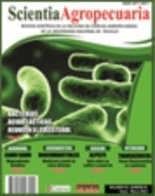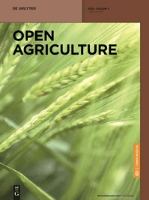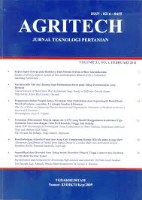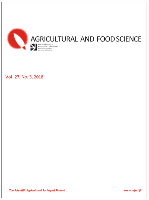
International Food and Agribusiness Management Review
Scope & Guideline
Navigating Trends in Food and Agribusiness Management
Introduction
Aims and Scopes
- Sustainability and Resilience in Agribusiness:
The journal focuses on sustainable practices within agribusiness, exploring how resilience can be enhanced across food supply chains, particularly in the face of environmental challenges and climate change. - Technological Innovations in Agriculture:
IFAMA emphasizes the role of technology in agribusiness, including the adoption of digital tools, blockchain, and precision agriculture to improve productivity and efficiency. - Economic Analysis of Food Systems:
Research published in the journal often includes economic evaluations of food supply chains, market dynamics, and consumer behavior, providing insights into economic performance and policy implications. - Social Capital and Community Engagement:
The journal explores the importance of social networks and trust in agribusiness transactions, highlighting the role of cooperative structures and community-driven initiatives. - Consumer Preferences and Market Trends:
IFAMA addresses changing consumer preferences, including demand for organic, local, and sustainable food products, and how these trends affect market strategies.
Trending and Emerging
- Digital Transformation in Agribusiness:
There is a growing emphasis on the role of digital technologies in transforming agribusiness practices, including the use of data analytics, blockchain, and e-commerce platforms to enhance efficiency and transparency. - Climate Change Adaptation Strategies:
Research focusing on how agribusinesses can adapt to climate change is trending, with an emphasis on resilience strategies, sustainable practices, and the economic implications of climate impacts. - Consumer-Centric Innovations:
Emerging studies are increasingly centered around consumer behavior and preferences, particularly regarding sustainability, health, and ethical considerations in food production and consumption. - Collaborative and Cooperative Models:
There is a rising interest in collaborative models and cooperative structures that empower smallholder farmers and enhance community engagement within food systems. - Food Supply Chain Resilience:
The COVID-19 pandemic has highlighted the need for resilience in food supply chains, leading to increased research on risk management, supply chain flexibility, and crisis response strategies.
Declining or Waning
- Traditional Agricultural Practices:
Research focusing solely on conventional agricultural practices without integration of sustainability or technology is becoming less prevalent as the agricultural sector moves towards more innovative and sustainable approaches. - Local vs. Global Market Dynamics:
Studies that exclusively examine local market dynamics without considering global influences are declining, as the interconnectedness of global supply chains becomes increasingly significant. - Static Economic Models:
The use of static economic models that do not incorporate dynamic factors such as consumer behavior changes or environmental impacts is decreasing, with a preference for more comprehensive, adaptable models. - Single-Disciplinary Approaches:
Research that does not integrate multiple disciplines, such as economic, social, and technological perspectives, is less common, as the complexity of agribusiness challenges necessitates a broader approach. - Focus on Traditional Crop and Livestock Production:
There is a noticeable reduction in research centered on traditional crop and livestock production methods, as interest shifts towards innovative practices, including urban agriculture and alternative proteins.
Similar Journals

Studies in Agricultural Economics
Pioneering Research for Rural Development SolutionsStudies in Agricultural Economics is a premier journal published by AGRARGAZDASAGI KUTATO & INFORMATIKAI INTEZET in Hungary, focusing on innovative research in the interdisciplinary fields of agricultural, biological, and economic sciences. Since becoming an Open Access journal in 1997, it has aimed to enhance the visibility of agricultural economics scholarship while promoting global engagement among researchers, practitioners, and policymakers. With its robust Q2 and Q3 rankings across varied categories including Development and Geography, this journal serves as a significant platform for disseminating cutting-edge studies that address crucial issues in agriculture and rural development. The journal's continuous publication since 2011 until 2024 exemplifies its commitment to providing timely insights into evolving agricultural challenges. With a strong Scopus ranking across multiple domains, particularly in the social sciences and agricultural sectors, it stands as a vital resource for anyone looking to advance knowledge and practice in these critical areas.

Australasian Agribusiness Review
Navigating Contemporary Issues in Agribusiness ExcellenceAustralasian Agribusiness Review, published by the University of New England's Business School Center for Agribusiness, is a premier journal dedicated to advancing the study and practice of agribusiness in the Australasian region and beyond. With a commitment to fostering high-quality research, this journal serves as a crucial platform for scholars and industry professionals alike, offering insights into contemporary issues, innovations, and challenges within the agribusiness sector. Although it currently does not operate on an open access model, its publications are critical for anyone keen on understanding the economic, social, and environmental dimensions of agribusiness. The ISSN 1833-5675 and E-ISSN 1442-6951 uniquely identify this resource, making it easily searchable for researchers and academics. Engaging with this journal will equip readers with a deeper understanding of agribusiness dynamics and contribute to the ongoing conversation around sustainable practices in the industry.

Granja-Revista de Ciencias de la Vida
Fostering Innovation Across Earth and Environmental SciencesGranja-Revista de Ciencias de la Vida, published by the Universidad Politécnica Salesiana Ecuador, is a prominent open access journal that has been disseminating valuable research since 2002. With its ISSN 1390-3799 and E-ISSN 1390-8596, this journal serves as a vital forum for researchers in the fields of Agricultural and Biological Sciences, Biochemistry, Earth Sciences, and Environmental Science. Ranking in the Q3 and Q4 quartiles for various categories according to Scopus, it occupies a significant position within its disciplines, with an HIndex that underscores its scholarly impact. Granja aims to foster interdisciplinary collaboration and innovation by publishing rigorous research articles, reviews, and case studies that address contemporary challenges in life sciences, primarily within the context of Ecuador and Latin America. The journal’s commitment to open access ensures that its findings are readily available to a global audience, enhancing the visibility and application of research for academics, professionals, and policymakers alike.

Temas Agrarios
Championing Open Access to Transformative Agricultural ResearchTemas Agrarios is a premier scholarly journal focused on the dynamic field of agricultural sciences, published by the University of Córdoba, Faculty of Agricultural Sciences. Since its establishment, this journal has committed to advancing knowledge and fostering research in agricultural practices and policies, contributing significantly to the discourse surrounding food security, sustainable farming, and rural development. With an open access model implemented in 2003, Temas Agrarios ensures that critical information and research findings are readily available to the global academic community, promoting wider dissemination and accessibility. Researchers, professionals, and students can benefit from its insightful articles, which address pressing agricultural issues in Colombia and beyond, enhancing both local and international scientific dialogue. Although specific impact metrics such as H-index and Scopus rankings are not disclosed, the journal's longstanding presence underscores its importance as a platform for high-quality agricultural research.

Scientia Agropecuaria
Bridging theory and practice in the world of agricultural sciences.Scientia Agropecuaria, an esteemed journal published by the Universidad Nacional de Trujillo’s Faculty of Agricultural Sciences, is dedicated to advancing research in the fields of Agronomy, Animal Science, and Soil Science. With a rich heritage since its inception, the journal has embraced Open Access since 2010, ensuring global dissemination of knowledge to researchers and practitioners. Hailing from Trujillo, Peru, it plays a vital role in the scientific community, capturing a Q3 ranking across multiple categories in the 2023 category quartiles, which reflects its growing influence, supported by its commendable Scopus percentile rankings. The scope of the journal is to publish original research, reviews, and insights that address critical issues and innovations in agriculture and related fields, making it a key resource for researchers, professionals, and students aiming to stay abreast of cutting-edge developments. As the journal continues its convergence until 2024, it remains an important platform for impactful contributions to the agricultural sciences.

Open Agriculture
Empowering Research for Global Food SecurityOpen Agriculture, published by DE GRUYTER POLAND SP Z O O, is an innovative open-access journal dedicated to advancing research in the Agricultural and Biological Sciences. Since its inception in 2016, this journal has been committed to disseminating knowledge and facilitating collaboration among researchers, professionals, and enthusiasts in the agricultural sector. With an impressive Q2 ranking in the Agricultural and Biological Sciences category, it holds a prestigious position, ranking #65 out of 221 in its field, placing it in the 70th percentile. Open Agriculture offers a platform for high-quality research across a diverse range of topics, ensuring that crucial findings are readily accessible to the global scientific community. The journal continues to uphold its mission of promoting sustainable agricultural practices and innovations that address contemporary challenges in food security and environmental sustainability. With its strong commitment to open access principles, researchers and students alike can easily engage with cutting-edge research and contribute to the vibrant discourse surrounding modern agriculture.

German Journal of Agricultural Economics
Empowering Research in Agricultural and Biological SciencesThe German Journal of Agricultural Economics, published by the esteemed DEUTSCHER FACHVERLAG GMBH, serves as a pivotal platform for the dissemination of research in the fields of Agricultural and Biological Sciences as well as Economics and Econometrics. Situated in Germany, this journal, with ISSN 0515-6866 and E-ISSN 2191-4028, has established a notable presence, reflected in its 2023 category quartiles—ranking Q2 in Agricultural and Biological Sciences (miscellaneous) and Q3 in Economics and Econometrics. With a converged publication timeline from 2011 to 2024, it aims to foster dialogue and research innovation related to agricultural economics, with an emphasis on contemporary challenges and advancements in the sector. The journal seeks to cater to a diverse audience, including researchers, professionals, and students, by providing access to high-quality, peer-reviewed articles that contribute to the ongoing discourse in these critical areas of study. Whether you are looking to keep abreast of the latest findings or seeking publishing opportunities, the German Journal of Agricultural Economics is an essential resource for anyone engaged in agricultural and economic research.

International Journal of Agricultural Sustainability
Elevating Agricultural Sustainability Through Open AccessThe International Journal of Agricultural Sustainability, published by Taylor & Francis Ltd, is a leading platform for researchers and professionals in the field of agricultural science, economics, and sustainability. With an impact factor that reflects its strong academic credibility and contribution to the field, the journal has earned esteemed rankings, including Q1 in Agronomy and Crop Science and Q2 in Economics and Econometrics for 2023. Engaging an audience keen on advancing sustainable agricultural practices, the journal has embraced Open Access since 2023, facilitating broader dissemination of vital research findings. With Scopus ranks placing it in the top quartiles and percentiles within its categories, the International Journal of Agricultural Sustainability aims to foster interdisciplinary dialogue and innovative approaches to agricultural sustainability, making it an essential resource for students, researchers, and industry professionals alike.

Agritech
Innovating the Future of Farming Through TechnologyAgritech is a prominent open-access journal dedicated to advancing the field of agricultural technology. Published by UNIV GADJAH MADA, FAC AGRICULTURAL TECHNOLOGY, this esteemed journal disseminates innovative research and cutting-edge practices that contribute significantly to sustainable agriculture, precision farming, and environmental stewardship. Launched in 1999, Agritech has established itself as a vital resource for researchers, professionals, and students alike, providing a platform for the exchange of ideas and findings that shape the future of agricultural technology. By embracing an open-access model, the journal ensures that high-quality research is accessible to a global audience, promoting collaboration and knowledge sharing in the agricultural community. With an ISSN of 0216-0455 and an E-ISSN of 2527-3825, Agritech remains committed to enriching agricultural practices and policies through rigorous scientific inquiry and innovation.

AGRICULTURAL AND FOOD SCIENCE
Fostering interdisciplinary insights for a thriving agricultural sector.AGRICULTURAL AND FOOD SCIENCE is a prestigious journal published by the SCIENTIFIC AGRICULTURAL SOCIETY OF FINLAND, dedicated to advancing knowledge in the fields of agricultural and food sciences. With an ISSN of 1459-6067 and E-ISSN of 1795-1895, this open-access journal has been providing valuable insights and research findings since its inception in 2002. As of 2023, it holds a Q3 ranking in Food Science and is positioned at the 46th percentile within its Scopus category, ranking 210 out of 389 journals in Agricultural and Biological Sciences – Food Science. The journal features contributions from a global network of researchers, covering various topics including sustainable agricultural practices, food safety, and innovative food technologies. Based in Finland, the journal serves as an essential platform for scholars, professionals, and students who are committed to enhancing food security and agricultural productivity through rigorous scientific research. The convergence of interdisciplinary studies from 2004 to 2024 marks a critical evolution in the scope of agricultural and food research, making this journal a vital resource for anyone involved in these dynamic fields.